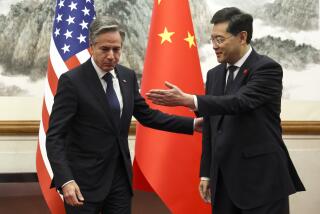Trying to Quell Hong Kong’s Fears, China Increases Them
- Share via
SHANGHAI — With anxiety rising before Hong Kong’s reversion to Chinese rule next year, Chinese leaders have traveled to the British colony to reassure residents about the impending hand-over. But their public relations effort appears to be backfiring.
Weekend consultations on the formation of Hong Kong’s next government went awry when Beijing withdrew invitations to certain participants and ejected speakers for their dissenting views, leaving some people more doubtful than reassured about the survival of Hong Kong’s freedoms.
In another jarring incident, some of the lawmakers earmarked by Beijing for eviction from office in 1997 led hundreds of demonstrators toward China’s de facto embassy in Hong Kong as the consultations were being held Sunday. The protests turned tense when a group splintered off and mobbed a Chinese official, who had to flee in a taxi.
On Thursday, Beijing will have another chance to repair ruptured confidence when China’s top policymaker for Hong Kong, Lu Ping, meets with the territory’s chief secretary--and rumored next leader--Anson Chan. Lu refuses to meet with his counterpart, British Gov. Chris Patten.
The body overseeing the transition, known as the Preparatory Committee, had invited a range of business leaders and political and social groups to the weekend meeting to discuss the selection of Hong Kong’s next governor--but banned pro-democracy leaders.
When two Democratic Party members planned to appear as representatives of the Professional Teachers’ Union, the organizers withdrew the union’s invitation. The teachers were replaced by two delegates from the Hong Kong Federation of Students, who stripped off their jackets before their planned speech to reveal T-shirts with slogans such as “False Consultations.” The students were ejected.
“We had no choice but to make them leave,” said Chen Zuoer, the Chinese official running the meeting. Chen said dissenters should go through “reasonable channels,” such as telephone calls and letters.
Some opposing voices were allowed. Members of Hong Kong’s bar association and of the Hong Kong Journalists Assn. spoke, although both groups have previously registered strong objections to China’s plans to replace the territory’s elected legislature with a handpicked one after the hand-over.
“I was encouraged by the fact that the Preparatory Committee did not withdraw the invitation for us to attend,” said Gladys Li, who chairs the bar and has termed the provisional legislature “illegal” on purely technical--but not political--grounds. “It’s one very small step.”
David Chu, a legislator and Beijing-appointed member of the Preparatory Committee, said China is simply trying to broaden support for its post-1997 plans. “It’s not a matter of China not knowing what those small groups think. The problem is that they [the dissenters] refuse to accept the right point of view.”
More to Read
Sign up for Essential California
The most important California stories and recommendations in your inbox every morning.
You may occasionally receive promotional content from the Los Angeles Times.













